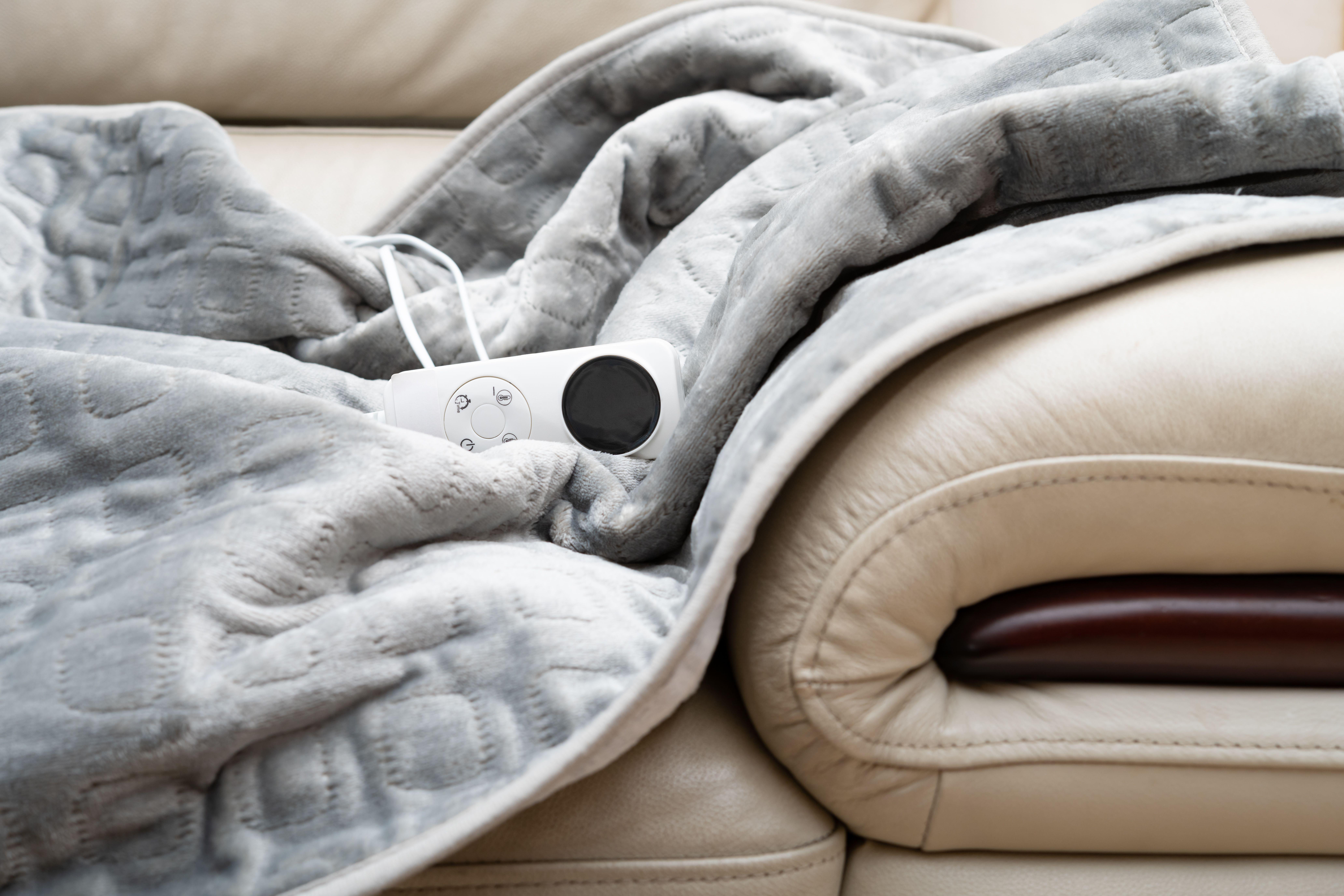
The costs in this article have been updated to reflect the latest figures under the energy price cap. We have also fact-checked it and removed or updated any out of date information or context.
Knowing how much an electric blanket costs to run is vital if you are planning to use one to keep warm over the colder months.
Electric blankets have always been a popular choice for cold nights with families having the choice of heated over-blankets, under-blankets, mattress protectors and throws. These bedding products are made from a heavy, sturdy material with an internal integrated wiring system that provides warmth and heat through coil wires when plugged into an electrical socket.
Sounds toasty, right? But with families still worried about how much their energy bills will cost over winter, despite a drop in the energy price cap, is an electric blanket the right option?
Goodto's Money Editor, Sarah Handley says: "The price we pay for our gas and electric has come down since the summer of 2023, but it's still higher than before the energy crisis hit. This matters less in the warmer months, when families aren't relying on their central heating. But as temperatures drop, and we use more energy to stay warm, our energy bills can jump up dramatically."
How much does it cost to run an electric blanket?
A 150W electric blanket costs about 4p an hour to run. If you use it for eight hours every day from October to March, it will cost a total of £59.10.
But if you have a 300W electric blanket, you can expect to pay running costs of about 8p per hour, and £118.20 a year (if used for eight hours a day from October to March).
The exact figure will depend on the type, specification and energy rating of your electric blanket, how often you use it and how much you pay for your energy. We're using the energy price cap's electricity unit price of 27p per kiloWatt hour (kWh) for our calculations.
Parenting advice, hot topics, best buys and family finance tips delivered straight to your inbox.
The following table shows how much it costs to run an electric blanket with different wattages for various amounts of time at current energy prices.
| Header Cell - Column 0 | Cost per hour | Cost per day (8 hours) | Cost per month | Cost per year (if used between October and March) |
|---|---|---|---|---|
| 50W | 1.35p | 10.8p | £3.28 | £19.70 |
| 100W | 2.7p | 21.6p | £6.57 | £39.40 |
| 150W | 4p | 32.4p | £9.85 | £59.10 |
| 200W | 5.4p | 43.2p | £13.13 | £78.80 |
| 250W | 6.8p | 54p | £16.42 | £98.50 |
| 300W | 8.1p | 64.8p | £19.70 | £118.20 |
Most retailers include running costs on adverts for electric blankets. Some claim to cost as little as 1p a night – but these estimations often don’t use the latest energy prices. So, for a more accurate idea of how much using your specific electric blanket costs per day, you’ll need to do a few sums.
Les Roberts of energy comparison site Bionic says the first thing you need to do is find out how much energy your appliance uses per hour.
“Your electric blanket should have the wattage printed on it or in the instruction pamphlet. Electric blankets are usually about 100 to 150 watts. Divide the wattage by 1,000 to convert to kilowatt-hours. This is how much energy the appliance uses per hour,” he explains.
So, for a 100W electric blanket the calculation would be:
100 divided by 1000 = 0.1. This is how many kilowatt hours of electricity your blanket uses.
Multiply this answer by 0.27. This is the average price you will pay for a unit of electricity under the latest energy price cap. Alternatively you can take a look at a recent energy bill to see how much you currently pay for a unit of electricity Bionic's Les Roberts says: “Once you have calculated the kilowatt-hours and know your energy rate you can work out how much your appliance costs to run in a certain time scale.”
With this example calculation, the answer is 2.7p. This means a 100W electric blanket costs 2.7p an hour to run.
It's also worthwhile checking how much other appliance cost to run, especially the most energy hungry ones. Luckily we've done the sums for you when it comes to how much it costs to run a tumble dryer, how much it costs to run a washing machine, and how much electricity a TV uses and how much that costs too.

Are electric blankets energy-efficient?
Electric blankets are definitely much more energy efficient than leaving your central heating on all night or using an electric heater (you can see how much does it cost to run an indoor heater here so you can compare costs).
According to research by savings platform Raisin, keeping your radiators on all night would cost you £10.80 a night. In comparison, even a 300W electric blanket costs less than £1 to use all night. If you have a family, running four 300W electric blankets still costs less than half the cost of leaving your central heating on all night.
Analysis by Octopus Energy’s data team showed that customers who used electric blankets reduced their energy bills by 19% last year compared to a control group.
You could cut your costs even more by taking a hot water bottle to bed instead - we've done the sums to see which is cheaper in our electric blanket versus hot water bottle guide.
What features should you look for when buying an electric blanket?
Electric blankets massively vary in price. A 40W single ‘Cosy And Warm Electric Blanket’ from Dunelm costs just £22, while this Snuggledown Intelligent Warmth kingsize electric blanket from Amazon costs £105.
Nigel Best, director of electrical training provider Electrician Courses 4U, says: “Before purchasing your blanket, check it has the UK safety standard mark (the kitemark) to ensure it meets current regulations. Electric blankets cause more than 5,000 house fires every year so this simple check is well worth your time.”
Robert Slade, managing director at health and wellbeing company Beurer UK, says: “Most electric blankets will tend to heat the bed to more or less the same temperature, so shoppers should really be looking out for those extra features that will enhance comfort and provide peace of mind.
“For maximum comfort and warmth fabrics should be soft and cosy, and any wires should be ultra-thin. For an extra touch of luxury, look out for teddy or fleece options.”
Size and material
Electric blankets come in single, double, queen, king, etc sizes. The cheapest ones are polyester while fleece or faux-fur blankets and throws will be more expensive.
The type of electric blanket
Do you want heat under or over you? Electric under-blankets and mattress protectors sit on top of the mattress and are usually fixed to it. Electric over-blankets can be used as well as, or instead of, a duvet. Throws are more versatile and can be used on the sofa too.

Heating controls
Most electric blankets have variable heat settings and a timer. Some have dual controls for couples, and many offer different heating zones such as sides of the bed or feet.
The wattage
As well as impacting how much your electric blanket costs to run, its wattage will affect how quickly the blanket heats up and how hot it will get. A higher wattage electric blanket may be more expensive, but it might get hotter than lower wattage alternatives and then you won't need to use it for as long.
How much does an electric blanket cost?
How to cut the cost of running an electric blanket
- Don’t leave it on all night A blanket with a timer means you can program it to switch off after a set period rather than keeping it on all night. If you don't have a blanket with a timer, consider using your blanket with a smart plug to schedule when you turn it off
- Use a low heat setting Electric blankets generally come with three or more heat settings – the lower the setting, the cheaper it will be.
Can you leave an electric blanket running overnight?
According to the fire service, you should only leave a blanket switched on all night if it has thermostatic controls for safe all-night use. Otherwise you should switch it off and disconnect it before you get into bed.
You should also make sure that you are only using the blanket according to instructions and store it correctly when it's not in use. Nigel Best, from electrical training provider Electrician Courses 4U, says: “As with any appliance there are dangers associated with electric blankets which must not be overlooked."
The fire service highlights potential danger signs to look out for, including:
- Frayed fabric
- Scorch marks
- Exposed elements
- Creasing or folding
- Soiling
- Damp patches
- Worn flex
- Loose connections.
If you spot any of these signs on your existing blanket, you should have it checked by a qualified electrician or buy a replacement.
Can you wash an electric blanket?
Most electric blankets can be put in the washing machine, but it's best to check the care label first to check whether your specific blanket is washable, and if there are any specific rules about which cycle you should use.
According to washing machine manufacturer Whirlpool: "You can machine-wash your electric blanket as long as the care tag indicates that it is safe. Washing an electric blanket may require a gentle, short cycle on a low-speed spin with minimum agitation and specific water temperature that differs from a normal wash. Due to the heating element, extra care may be necessary."
To keep a handle on your energy bills over winter, it's worth knowing how many hours a day should heating be on in the UK and how to save energy in homes to keep your bills as low as possible.

Emma Lunn is a multi-award-winning journalist who specialises in personal finance and consumer issues. With more than 18 years of experience in personal finance, Emma has covered topics including all aspects of energy - from the energy price cap to prepayment meter tricks, as well as mortgages, banking, debt, budgeting, broadband, pensions and investments. Emma’s one of the most prolific freelance personal finance journalists with a back catalogue of work in newspapers such as The Guardian, The Independent, The Daily Telegraph, the Mail on Sunday and the Mirror.
